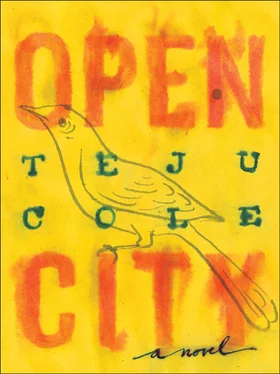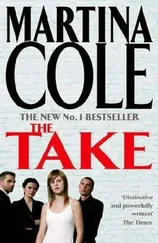Just then, our house prefect arrived, fresh from a raid of my possessions, holding the newspaper aloft. He had found it next to my bag, under my bunk. It wasn’t a plant: I had placed it there. I had glanced at it, found nothing of interest in it, and dropped it under my bed. Under the glare of an interrogation, with my collar violently chafing my neck, in Musibau’s grip, and a sudden sense of isolation, I connected, for the first time, this alleged theft with my own actions. When lunch had ended that afternoon, I had seen a discarded copy of the Daily Concord on a bench, and brought it back to the house with me. There was the error. My conscience clouded, and I began to beg and to explain, until another slap silenced me.
Musibau frog-marched me to each of the neighboring houses, and in each the house prefect roused his charges, and Musibau, his clawlike hand again welded to my collar, began his recitation: thief, maggot, newspaper, bloody civilian. The senior boys joked and sniggered. The juniors were more solemn but equally seized by the spectacle. This is what happens to rich little thieves, Musibau said, his anger settling into a pattern, these are the rich little maggots who swallow our country whole, see with your eyes how they are. We went around to each of the six houses, my hands clasped behind me, my legs on the edge of collapse, and eventually every boy in school was introduced to me, the little thief. But they would have seen, too, Musibau’s bitterness; a lieutenant headed the arts department, a colonel ran the school, a council of generals ruled the country. In this hierarchy, Musibau was both secure and utterly lost. He was no longer young; he would probably die a second-class warrant officer. He looked at me, a half-Nigerian, a foreigner, and what he saw was swimming lessons, summer trips to London, domestic staff; and thus, his anger. But his imagination misled him.
My ordeal that afternoon ended, and I went back to my dormitory. I changed into a clean uniform, shined my boots, straightened my beret, and got ready for evening prep. The following morning, while I was in technical drawing class, Musibau reappeared. He had a quick word with my teacher, then invited me to the front of the class. He stood without a word for a moment, facing the boys. Then he rehearsed his litany, refined now to a minimalist statement of indictment: This boy is a thief. He stole a newspaper, a newspaper that rightfully belonged to a member of staff. He is a disgrace to the Federal Republic of Nigeria, and to the armed forces of the Federal Republic of Nigeria, and to the Nigerian Military School. He did not think of the consequences, and will now be punished.
Musibau motioned to me to undo the metal side fastener on my shorts. I bared my buttocks and bent over, using the blackboard for support. He caned me. It took effort, and he sweated from the exertion, methodically bringing the cane down on me. I flinched but held back tears as the welts rose in quick, sharp lines. I had assumed he would stop at six, but he only paused at six, and then continued, all the way to twelve. My classmates were silent. I was a popular boy, and they were genuinely sorry for me. I pulled my shorts back on. Sitting was difficult; my entire body burned. The technical drawing teacher continued his lecture without comment.
When that semester ended and I went home, I could say nothing about any of this to my mother. If I hadn’t forced myself back into the normal life of the school, I might have sunk. I learned not to be angry when the senior boys called me Daily Concord. The junior boys didn’t say anything to my face. I won some dignities back and, in fact, my performance under the cane became a little legend of its own. In some iterations, it was twenty-four strokes across the back; in others, blood had flowed freely, and I had told Musibau to go hang himself. I gained a reputation for fearlessness and, coincidentally or not, I also began to do well academically. By the fourth year, I was popular with the girls at some other schools in the town, and had developed a somewhat callous self-confidence. In my final year at NMS, I was named health prefect. Some of my mates said that, had it not been for the incident with Musibau, I might even have made head boy.
The end of my time at the school coincided with the end of my time in Nigeria. My mother knew I was taking the SAT, but she didn’t know about my applications to colleges in America; my purchase of a post office box helped perfect the concealment. I used up my few savings on college application fees. I had no luck with Brooklyn College, Haverford, or Bard (names I had plucked out of a tattered volume at the library of the United States Information Service in Lagos). I got into Macalester, but was offered no money; but Maxwell accepted me, and gave me a full scholarship. My course had been charted. With borrowed money from my uncles, I bought a ticket to New York to begin life in the new country, fully on my own terms.
Winter deepened without becoming appreciably colder. I had decided definitively to use up all my vacation time, which came to a little over three weeks, on a trip to Brussels. The days I had accumulated were too many to make a hotel, or even a hostel, a reasonable option, and so I went online, and found a short-term flat rental in a central district of the city. The apartment, as pictured, was rudimentary to the point of being spartan; it was, as such, ideal for my purposes. I exchanged a few emails with a woman named Mayken, and once the matter of housing was settled, I bought a ticket for departure the following weekend.
On the flight, I was seated next to an elderly lady. She was older than my mother, but perhaps not old enough to be my grandmother. We had taken our seats in silence, and her voice, when it first reached me, did so out of darkness. My eyes were closed: I was relieved to have ended the long day of preparing for the journey, having worked overnight the previous night. I was in a fatigued blur all through the process of packing my bags, taking the subway to Kennedy Airport, confronting the disorder of holiday crowds, and controlling my anger at the inept boarding agents at Terminal Three. Finally, settling into my seat on the plane, I leaned back for a nap even before the other passengers had stowed their luggage or taken their seats.
Normally, I would have been curious about the person in the seat next to mine, a curiosity that was almost always disappointed. I would soon afterward find myself eager to get the small talk done with and, the absence of mutual interests firmly established, to return to the book I was reading. On this occasion, though, I was already asleep when my flight partner arrived. I had a sleeping mask on, and it was only when we were aloft, and I heard the jangle of the approaching refreshment cart, that I revived and took the mask off. I didn’t open my eyes right away; I was trying to decide whether to interrupt my sleep for airline food, and was poised on the indecision. That was when I heard her voice, the measured voice of an elderly woman. I envy people like you, she said. I wish I was the kind of person who had the ability to fall asleep in any situation.
What I saw when I opened my eyes was a person with a head of gray hair, hair so thin it was as though the very substance of it, and not merely the color, were fading away. The face underneath this fragile crown was narrow and wrinkled, and the skin was covered in fine liver spots. But there was a firmness around the mouth and jaw, a prominence in the forehead, and a sharpness in the eyes. Undoubtedly, for most of her life, she had been a great beauty. The first thing she did, as I put my sleeping mask away, was wink, which took me aback, but to which I responded with a smile. She was dressed simply, in a tan-colored wool sweater, plaid pants, and brown leather boating shoes. She wore a double string of tiny pearls, and had on pearl earrings. The book on her lap, bookmarked with her index finger, was The Year of Magical Thinking . I hadn’t read the book, but I knew it was Joan Didion’s memoir of coming to terms with the sudden loss of her husband. Dr. Maillotte (she didn’t actually tell me her name until an hour or so later) wore a wedding ring.
Читать дальше












